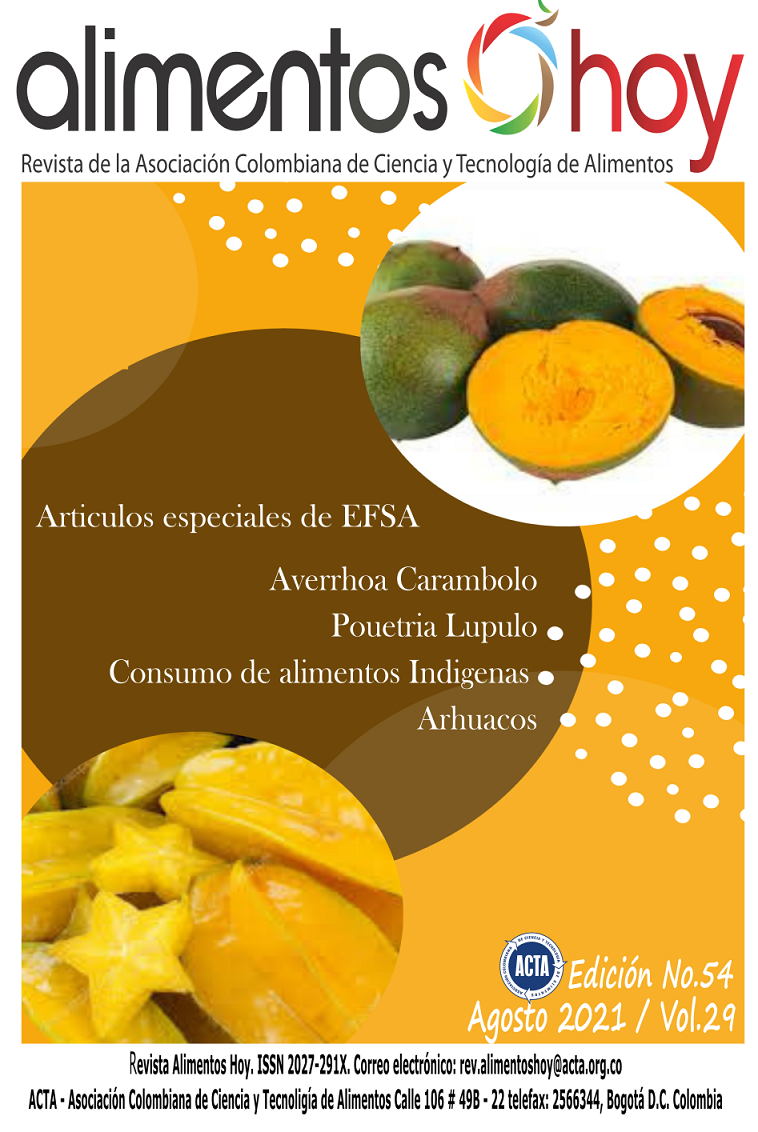Sección
Artículos de Ciencia y Tecnología
Licencia
A. Derechos de autor1. El Autor(es) asigna(n) a ACTA durante el término de los Derechos de Autor o cualquier extensión o renovación del mismo todos los derechos de autor del artículo, incluyendo el derecho a publicar, transmitir, vender, distribuir y otros usos, así como el material contenido en medios electrónicos e impresos de la Revista Alimentos HOY y trabajos derivados en todo el mundo en cualquier lengua y medios de comunicación conocidos o posteriormente desarrollados, así como la licencia u otros permisos que sean requeridos. 2. La reproducción, publicación, divulgación u otros medios de distribución o uso del artículo o cualquier material contenido en cualquier medio requiere un permiso legal y una citación de la Revista Alimentos HOY y un apropiado crédito a ACTA como Publicador, en forma conveniente como sigue a continuación: Título del artículo, Autor(es), Título de la revista, Volumen, Año. B. Derechos conservados De acuerdo a lo descrito arriba, el Autor(es), o si es aplicable, el Empleador del Autor(es) responsable del artículo, mantienen todos los derechos de propiedad que van más allá de los derechos de autor, como son las patentes en cualquier proceso, procedimiento u objeto manufacturado descrito en el artículo, así como el derecho a realizar presentaciones orales y escritas del material del artículo. C. Otros derechos del Autor(es) ACTA garantiza al Autor(es) lo siguiente: 1. El derecho a compartir preimpresos con colegas, ya sea en forma impresa o electrónica del artículo no publicado, en forma y contenido como fue aceptado por ACTA para la publicación en la Revista Alimentos HOY. Tales preimpresos pueden ser publicados como archivos electrónicos en la página web del Autor(es) o Institución a la cual pertenece, restringido solamente en uso personal o profesional, pero no destinado para uso comercial o cualquier distribución sistemática realizada por terceras partes. Antes de su publicación en cualquier medio ya mencionado, el Autor(es) debe incluir la siguiente nota de impresión: “Este es un preimpreso de un artículo aceptado para su publicación en la Revista Alimentos HOY Copyright (año)”. Posterior a la publicación del artículo, la nota de impresión debe ser cambiada a la siguiente: “Este es un preimpreso de un artículo publicado en la Revista Alimentos HOY. El Autor(es) no podrá actualizar o modificar el artículo ya publicado en la Revista. 2. El derecho, sin costo, de fotocopiar, transmitir vía on-line, descargar, imprimir y distribuir a colegas una copia del artículo publicado ya sea total o parcial, para uso personal o profesional del Autor(es), con fines educativos o avances en investigaciones de tipo científico, o con fines informativos, en concordancia con el parágrafo D2. 3. El derecho a publicar, sin costo, ya sea de forma parcial o total, el artículo publicado en la Revista Alimentos HOY en un libro escrito o editado por el Autor(es). 4. El derecho a utilizar tablas y figuras seleccionadas, así como mencionar texto seleccionado del artículo con propósitos meramente académicos o para la incorporación con otro trabajo realizado por el Autor(es) que sea parte de un trabajo editado y publicado (en forma impresa o electrónica) por terceras partes, o para la presentación en formato electrónico de una red interna o externa de la página web del Autor(es) o Institución a la cual pertenece. El derecho a incluir en el artículo, en una compilación con fines de enseñanza en salón de clases (Cursos), que puede ser distribuido sin costo, en la Institución donde pertenece el Autor(es) y el cual podrá ser almacenado en formato electrónico para acceso por parte de estudiantes de los cursos ya mencionados así como programas virtuales de entrenamiento de la Institución a la cual pertenece el Autor(es). D. Propiedad del Artículo por parte del Empleador (Institución a la cual pertenece el Autor(es). 1. Si el artículo fue escrito por el Autor(es) en el transcurso del empleo del Autor(es), el artículo es propiedad de la Compañía/Empleador el cual deberá firmar este Acuerdo (Adicionando la firma del Autor principal), en el espacio destinado para este fin en la parte inferior de este documento. En tal caso, la Compañía/Empleador asignará legalmente a ACTA, durante el término de los derechos de autor, todos los derechos de autor del artículo por todas partes del mundo, tal como es especificado en el parágrafo A en la parte superior. E. Contratos con el Gobierno En el caso que el artículo haya sido elaborado bajo el contrato o garantía del Gubernamental, el Gobierno de Colombia puede reproducir, sin costo alguno, el artículo parcial y puede autorizar a otros organismos realizar esta labor, con fines meramente oficiales. F. Observación de Derechos de Autor El Autor(es) y la Compañía/Empleador que estén de acuerdo que cualquier o todas las copias del artículo o partes del mismo puedan ser distribuidas o publicadas en forma impresa o electrónica deberán incluir el aviso de derechos de autor, tal y como es estipulado en la Revista Alimentos HOY, así como una citación completa de la Revista y de ACTA como publicador. G. Representaciones del Autor(es) El Autor(es) deberá presentar el trabajo original del artículo. Si el artículo fue elaborado en conjunto, el Autor responsable deberá informar a los coautores acerca de los términos de este Acuerdo y conseguir su consentimiento (firma). El artículo sólo será sometido para su publicación en la Revista Alimentos HOY si no ha sido publicado antes, a excepción de los preimpresos tal y como se mencionó anteriormente. (Si el trabajo incluye extractos de manuscritos realizados por terceros y que sean protegidos por derechos de autor, el Autor(es) deberá obtener un permiso escrito por parte de estos terceros para su uso en la publicación en la Revista Alimentos HOY. Adicionalmente, deberá mostrar en el artículo el crédito correspondiente a estas fuentes. El Autor(es) también garantizará que el artículo no contiene declaraciones calumniosas o ilegales, que no infringe derechos de privacidad de terceros o que su contenido tenga material o instrucciones que puedan causar daños y/o perjuicios.

